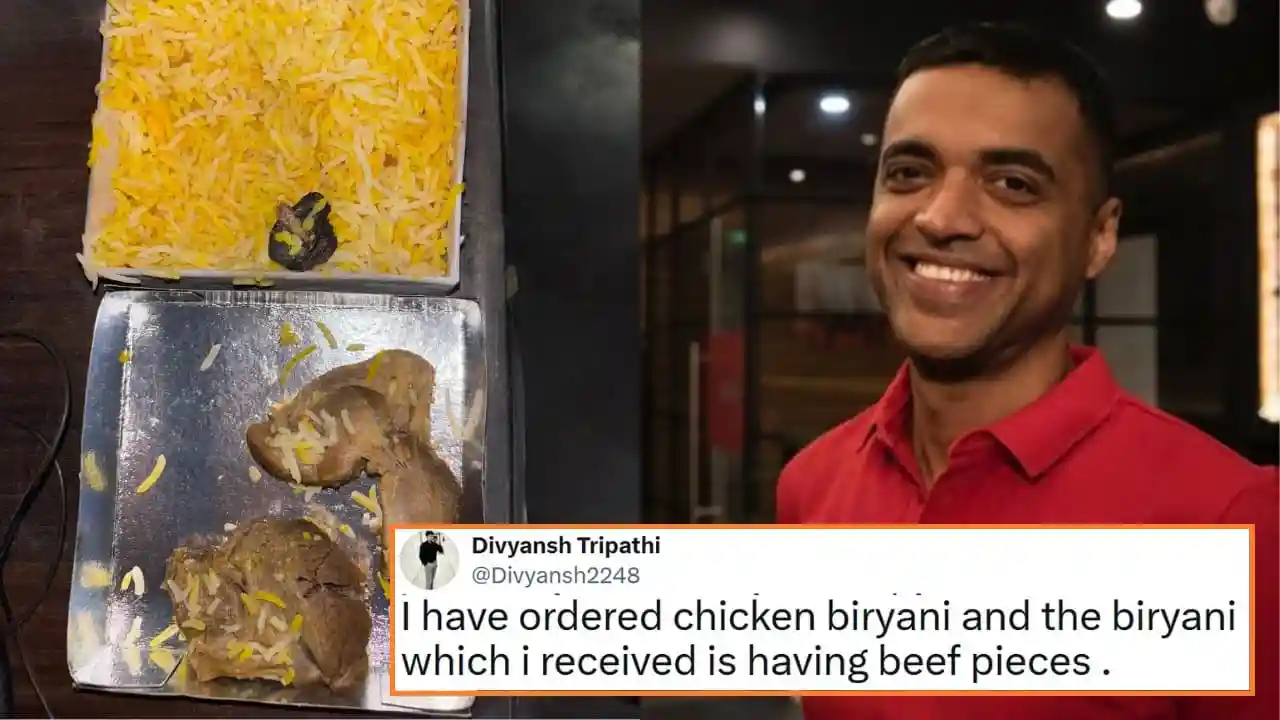A food delivery controversy has once again hit Zomato after a customer from India claimed that he received beef instead of chicken biryani in his recent order. The incident quickly went viral online, with users demanding strict action and highlighting concerns about religious sentiments and food safety.
Customer Claims Beef Found in Chicken Biryani Order
The complaint was posted on X (formerly Twitter) by user Divyansh Tripathi on October 6, 2025. He shared pictures and videos of the biryani, claiming that the pieces looked like beef and not chicken.
Tripathi wrote, “I want instant action on this… this is something about the religious matter,” tagging @zomato and @zomatocare in his post.
The post immediately caught public attention, crossing 500K views within hours and creating a wave of online debate about trust issues in food delivery apps.
Family Shock and Public Outrage Online
The timing of the incident during Navratri, a religious festival when many people avoid non-vegetarian food, made the situation even more sensitive. Many users commented that such mistakes are not just about food—they hurt cultural and emotional sentiments.
People flooded X with hashtags like #ZomatoBeefScandal, #BoycottZomato, and #WrongOrderReligious, urging authorities to take action.
Zomato’s Quick Response to the Viral Complaint
Zomato responded within a few hours, saying,
“Hi Divyansh, this is truly shocking for us as we take your dietary preferences very seriously and would never intend to disrespect them. Please share your order ID via DM so we can resolve this at the earliest.”
Despite the reply, Tripathi later posted that he had not received any concrete action from Zomato for more than 24 hours. Eventually, on October 8, Zomato issued a refund but did not reveal the restaurant’s name.
This response left many netizens unsatisfied, saying that Zomato should take stronger action against the vendor involved.
Why This Incident Sparked Big Reactions
This is not the first time such a food mix-up has gone viral. In 2023, a similar case from Varanasi and another in Pune (2024) showed food labeling errors where customers received meat instead of vegetarian items.
The issue has now raised questions about how food delivery companies verify, label, and inspect food orders before delivery.
According to the Food Safety and Standards Authority of India (FSSAI), complaints of food mislabeling and wrong orders have increased by 25% in 2025.
Religious Sensitivity and Food Safety in India
India’s food market is deeply tied to cultural and religious beliefs. With over 80% Hindus avoiding beef, even a small mistake in labeling can become a serious social issue.
Experts say food platforms like Zomato should strengthen their vendor checks, AI-based food tagging systems, and customer safety measures to rebuild public trust.
Netizens React With Mixed Emotions
The post received 10,000+ likes and 2,000+ retweets, with strong emotional responses:
- “Religious sentiments hurt, this is not just a mistake!”
- “Ordered chicken, got beef – what’s happening with quality checks?”
- “Refund is not enough, action needed against the restaurant.”
Some users also created memes around the controversy, showing how social media can turn even serious issues into viral trends.
Conclusion
The Zomato beef-chicken biryani controversy shows how easily a single delivery mistake can escalate online and affect public trust. While Zomato quickly issued a refund, the lack of clear accountability has left many users unsatisfied.
Such incidents remind both companies and restaurants that food safety, labeling accuracy, and cultural respect must be top priorities—especially in a diverse country like India.
FAQs
What was the Zomato beef-chicken biryani complaint about?
A customer, Divyansh Tripathi, claimed that he received beef pieces instead of chicken in his Zomato order and posted it on X (formerly Twitter).
How did Zomato respond to the complaint?
Zomato replied within hours, apologized, and promised an investigation. A refund was later issued to the customer.
Was this incident related to any religious issue?
Yes, it gained attention because beef consumption is a sensitive issue in India, especially during festivals like Navratri.
Have such incidents happened before?
Yes, similar mix-up complaints were reported in Varanasi (2023) and Pune (2024), raising questions about restaurant checks and delivery accuracy.
What action did people demand from Zomato?
Netizens demanded a stricter food verification process, public apology, and penalties for restaurants that make such errors.

